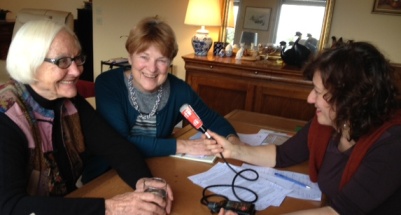
Alison Hird [right] interviewing Jan Hively [left] and Moira Allan in Paris
How would you answer that question? My answer is central to the rationale for the Pass It On Network.
Thanks to the 20th century’s medical miracles and improved access to good nutrition, life expectancy was extended by almost half, while access to birth control reduced the birthrate. The society has been aging, worldwide.
In every country, government officials responsible for health and welfare budgets describe aging as « our biggest problem. » They see medical care and pension needs growing while their public service budgets are diminishing. In France, for example, the number of workers with secure jobs, full health care and benefits is shrinking while the number of pensioners who retire, on average, at age 60 in this country that is second only to Japan for longevity, is rising. Some see a « war between the generations » with the cost of services at the end of life reducing the resources available for education or other services needed early in life.
Those responsible for providing health and welfare services, wherever they are, are often « ageist » — negative about older adults because they see only their needs, and not their strengths. Too often, older adults themselves see themselves as these negative service providers see them.
We’ve got the facts to shift the emphasis from needs to strengths – for example, to the productivity of older adults who are contributing social and economic value by continuing employment, volunteering community service, taking in their adult children, caring for their grandchildren, and caring for sick or disabled friends and relatives. We know that seniors who are doing meaningful work that helps others feel better and stay healthier than those who are receiving services without the opportunity to give back. We know that the top value of older adults is self-determination – making decisions for themselves. We can band together to raise awareness about our strengths.
21st century research shows the potential for wellbeing in later life. If we don’t have a disease, our brain cells regenerate so that we can continue teaching and learning lifelong. Creative expression is stimulated by late life changes in the brain, and active creative expression contributes to growth and wellbeing.
It’s particularly important to raise awareness about the strength and potential of older adults at this time when our resources are so desperately needed. The turmoil of the global economy now touches every one of us living on this planet. The effects of climate change include intense storms and resource shortages that are felt in all parts of the world. The nature of war has moved from battles in wars with a defined location and time period to ongoing conflicts that go on and on around the world. As spoken by a Hopi Indian elder, «The time of the lone wolf is over. We must gather ourselves. It is time for celebration. We are the ones we’ve been waiting for. »
Please join the conversation and share your thoughts with us.

Better than sitting by the fire.
I read this piece with great interest. Your comments are valuable and true – it is imperative that the views and wishes of senior citizens worldwide are clearly and strongly expressed. The time has come for our case to be stated strongly. On the one hand, here in the UK, I had once been told by a doctor that it “may be alright to prolong life by better health care, new discoveries, more efficient drugs etc, and yet we must bear in mind, that we are then all living longer – and the country then cannot afford to adequately support our healthcare and needs”. This smacks to me of suggesting that we may live longer, at the same time querying the purpose of this – are we then considered essentially to have no useful purpose for doing so? It implies that we may be alive, but are somehow of a lesser status than younger generations. Conversely, our Government is expecting us to all be working for considerably longer before we are able to draw on our state pensions. It expects us to continue our working lives to suit their budget. The Government cannot uphold our ability to continue using our great skills and knowledge, in whatever field, to their advantage, only to then deny us our due status and respect. These double standards have to stop before they become even more entrenched. It is refreshing that we now have a strong, clear voice in the Pass It On Network – long may this continue to the advantage of us all.
It is one of life’s mysteries that individual’s often acquiesce to what people want them to believe. Forces that would attempt to reduce them to nuisance value. The truth of how much individual’s contribute doesn’t necessarily decrease with age, as some would have us believe. We need strong, educated people to research the realities, and not the convenient sound bites that fit I’ll-informed agendas. That is why this is such a great idea.